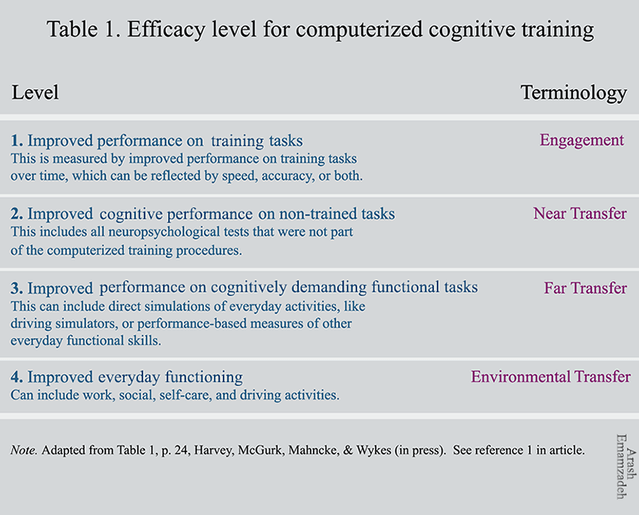Evidence review: Cognitive training & remediation works, especially in schizophrenia and healthy aging
 ___
___
Evidence That Computerized Cognitive Training Works (Psychology Today)
“Many people use computerized cognitive training with the hopes of preventing mental decline or improving mental performance. But do these brain training games actually work?
A recent article by Harvey and colleagues, in press in Biological Psychiatry, evaluates the effects of cognitive training in schizophrenia and healthy aging, concluding that computerized cognitive training (CCT) does work…

Source: Arash Emamzadeh (Harvey et al 2018; reference 1)
Using their now expanded definitions of cognitive training and effectiveness, the authors then review a number of trials and meta-analyses (on people with schizophrenia, and on older adults), and find consistent evidence that cognitive training is indeed effective, and that it also shows far transfer–transfer of learning from the computerized games to real world challenging functional tasks (see 3, in Table 1 above).”
The Study:
Controversies in Computerized Cognitive Training (Biological Psychiatry: Cognitive Neuroscience and Neuroimaging (Biological Psychiatry: Cognitive Neuroscience and Neuroimaging).
- Abstract: Computerized cognitive training (CCT) to improve cognitive functioning is of enormous interest and has been applied in a broad range of populations with goals of improving both cognition and community functioning. Recent reviews presenting negative conclusions about CCT efficacy have inconsistent definitions of the treatment targets and cognitive improvement. They do not present an accurate representation of the typical process of CCT and cognitive remediation (CR), especially as delivered in major mental illnesses, such as schizophrenia. This review provides guidance on the definition of CCT and CR, the use of CCT and CR, and the definition and measurement of cognitive and functional gains. The review focuses on schizophrenia and healthy aging, with each population receiving unique CCT or CR approaches, and substantial extant literature with which to elucidate fundamental CCT and CR concepts and research findings. It is our conclusion that CCT has been shown in most studies to improve cognitive performance on untrained tests, in healthy older people and in people with schizophrenia. Functional gains in schizophrenia appear limited to CR studies. Clearly defining CCT, CR, and levels of treatment related gains will be critical for understanding the benefits of these widely used treatment programs.
The Study in Context:
- Can brain training work? Yes, if it meets these 5 conditions
- What are cognitive abilities and how to boost them?
- Solving the Brain Fitness Puzzle Is the Key to Self-Empowered Aging
- Five reasons the future of brain enhancement is digital, pervasive and (hopefully) bright
- NHS Choices helps improve brain health and science literacy by reporting findings in context — as seen in this brain training & schizophrenia example


